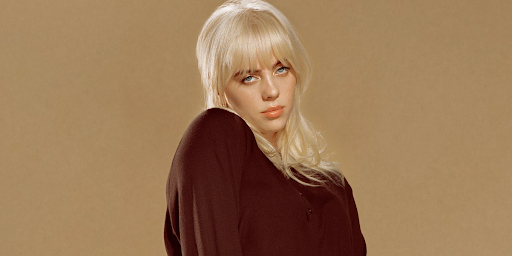Billie Eilish released her sophomore album Happier Than Ever on July 30, 2021. This album was reviewed by a fellow staff writer here at The Mycenaean — Moses Nyang’ute. His opinions were very daring, and in response, I am going to provide my thoughts on the album as well.
Nyang’ute reviewed Happier Than Ever near the beginning of September, 2021. He starts this review with his first impression of the album — it was “nothing more than okay” Nyang’ute writes.
Next, he recognizes the smooth transitions through “Not My Responsibility” and “Overheated.” Nyang’ute states that transitions are common throughout the album, making it feel like a one-hour song.
Nyang’ute despises the lyrics in Happier Than Ever, but he appreciates the instrumentals. He also feels that this album “is kind of basic and lacks various emotions;” he would like to see “more upbeat music.”
My REVIEW
Happier Than Ever is far from basic. This vulnerable and personable album tells a story with a wide variety of instrumentals and lyrics.
Eilish released her debut and record-breaking album When We All Fall Asleep, Where Do We Go back in 2019 when she was 17 years old. Between now and then, she has learned a lot about herself and the world.
“Getting Older” — the first song on Happier Than Ever — describes the changes she has gone through in the past few years. Eilish shares some personal reflections, such as “I’ve got more on my shoulders, but I’m getting better at admitting when I’m wrong.”
Through other lyrics in “Getting Older,” Eilish opens up about the harder things she has gone through recently. “Wasn’t my decision to be abused” Eilish sings near the end of the song. She tells her listeners “I’ve had some trauma, did things I didn’t wanna, was too afraid to tell ya, but now I think it’s time.”
This sets the tone for the album, letting fans know that she is ready to reflect on her younger years and how it has affected her.
After this introduction, the album lightens up a little bit with songs like “I Didn’t Change My Number,” “Billie Bossa Nova,” and “my future.” Through poised lyrics and optimistic instrumentals, these songs radiate the confidence that Eilish has regarding the place she is in her life.
Shifting away from positive lyrics, Eilish ruminates on her past in the music industry through the song “GOLDWING.” In this song, Eilish speaks to young people in all situations but specifically wants to reach young artists. She uses symbolism to describe this young demographic as innocent, untouched angels.
“Keep your head down,” she tells them. Eilish hints at her own negative experiences in the music industry when she tells her audience “they’re gonna tell you what you wanna hear then they’re gonna disappear, they’re gonna claim you like a souvenir just to sell you in a year.”
Moving onto relationships, Eilish includes two contradicting experiences in this album. Starting with “Lost Cause,” she radiates frustration with a past partner, singing “thought you would’ve grown eventually, but you proved me wrong. You ain’t nothin’ but a lost cause, and this is ain’t nothin’ like it once was.” This song lets the listeners know that Eilish is moving on from unchanging people that she was once holding on to.
Eilish also describes her experience with love before her partner turned into a “lost cause.” With gentle instrumentals, Eilish sings “I haven’t slept since Sunday, midnight for me is 3 am, for you. But my sleepless nights are better with you than nights could ever be alone.”
The next section in Happier Than Ever dives deeper into Eilish’s experience growing up in the spotlight. In “Not My Responsibility” and “Overheated,” she shares her experience with body shaming on the internet.
Eilish used “Not My Responsibility” in the interlude of her last arena tour Where Do We Go, which was canceled three shows in due to Covid-19. Not wanting this important message to slip away, she included it on this album. With limited instrumentals, Eilish addresses how people view her body:
“Though you’ve never seen my body
You still judge it
And judge me for it”
She also speaks on a larger scale:
“We make assumptions about people
Based on their size
We decide who they are
We decide what they’re worth”
Eilish ends the song with an impactful phrase: “Is my value based only on your perception? Or is your opinion of me, not my responsibility?” The end of this song flows directly into the next one — “Overheated.”
“Overheated” tackles the same issue. She references the paparazzi, singing “I started watchin’ them photographin’.” Eilish has faced body shaming due to paparazzi photos.
She sings “Is it news? News to who? That I really looked just like the rest of you” and “everybody said it was a let down / I was only built like everybody else now.” These lines express how Eilish feels about the expectations people had on what her body was supposed to look like. It also hints how people on social media reacted when they saw photos that didn’t meet these expectations.
The next song on Happier Than Ever, “Your Power,” is by far the most vulnerable song on this album.
In “Your Power,” Eilish sings about the manipulation she experienced during a relationship with an older man.
Like it was my fault, you were the devil”
She also sings, in general, about men preying on young women:
“Does it keep you in control?
For you to keep her in a cage?
You said you thought she was your age
How dare you
And how could you”
Eilish recently won the “Video for Good” VMA for “Your Power.” In her acceptance speech, she said “we need to protect our young women at all costs” and we “need to remember that we all have power and we have to remember to not abuse it.”
The two most notable songs on the remainder of the album are “Therefore I Am” and “Happier Than Ever” — both of which are upbeat and fan favorites.
As Nyang’ute stated in his article, “Therefore I am” was turned into a very popular TikTok trend when it came out as a single in 2020.
“Happier Than Ever” attracted the most attention out of the songs released with the album in July. Eilish starts off this song with a very melodic and graceful sound. She sings that she is “happier than ever” when she is away from a previous partner of hers. Halfway through the song, Eilish flips to anger.
She expresses her frustration with this partner, singing about his drinking and driving habits, the horrible treatment she received from him, his inability to be on time, and more. This song captures many different emotions and has an abundance of relatable lyrics.
Overall, Happier Than Ever is a very diverse and interconnected album. Through thoughtful lyrics and a plethora of emotions such as anger, confidence, disappointment, excitement and more, Eilish shares experiences that she had growing up with fame. She was able to communicate how she has grown over the years and speak up about issues that are important to her.

Hi! My name is Mary. I’m the engagement editor for The Mycenaean. I am a member of the Leesville Symphonic Band and I have 3 dogs!

Leave a Reply